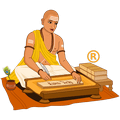























Sunrise05:47
Sunset17:30
MoonriseNo Moonrise
Moonset17:09
Shaka Samvat1849 Prabhava
Vikram Samvat1984 Pramathi
Gujarati Samvat1983 Bahudhanya
Amanta MonthAshadha
Purnimanta MonthShravana
WeekdayGuruwara
PakshaKrishna Paksha
TithiAmavasya upto 01:36, Jul 29
YogaVajra upto 19:27
KaranaChatushpada upto 13:36
KaranaNagava upto 01:36, Jul 29
Pravishte/Gate13
Rahu Kalam13:06 to 14:34
Gulikai Kalam08:43 to 10:10
Yamaganda05:47 to 07:15
Abhijit11:15 to 12:02
Dur Muhurtam09:41 to 10:28
Dur Muhurtam14:22 to 15:09
Amrit Kalam07:32 to 09:09
Amrit Kalam04:08, Jul 29 to 05:47, Jul 29
Varjyam18:13 to 19:52
Notes: All timings are represented in 24-hour notation in local time of Lospalos, East Timor with DST adjustment (if applicable).
Hours which are past midnight are suffixed with next day date. In Panchang day starts and ends with sunrise.


 Vrishabha 14:36
Vrishabha 14:36 Mrigashira 26:13+
Mrigashira 26:13+

 Mithuna
Mithuna Ardra 25:46+
Ardra 25:46+

 Karka 27:40+
Karka 27:40+ Ashlesha 27:40+
Ashlesha 27:40+

 Simha
Simha Magha 29:29+
Magha 29:29+

 Simha
Simha P Phalguni
P Phalguni

 Simha 14:28
Simha 14:28 P Phalguni 07:49
P Phalguni 07:49

 Kanya
Kanya U Phalguni 10:31
U Phalguni 10:31

 Kanya 26:53+
Kanya 26:53+ Hasta 13:26
Hasta 13:26

 Tula
Tula Chitra 16:19
Chitra 16:19

 Tula
Tula Swati 18:58
Swati 18:58

 Vrishchika
Vrishchika Anuradha 22:53
Anuradha 22:53

 Dhanu
Dhanu Mula 24:21+
Mula 24:21+

 Dhanu
Dhanu P Ashadha 24:10+
P Ashadha 24:10+

 Kumbha 12:01
Kumbha 12:01 P Bhadrapada 17:35
P Bhadrapada 17:35

 Meena
Meena U Bhadrapada 15:54
U Bhadrapada 15:54

 Meena 14:19
Meena 14:19 Revati 14:19
Revati 14:19

 Mesha
Mesha Ashwini 12:54
Ashwini 12:54

 Mesha 17:25
Mesha 17:25 Bharani 11:41
Bharani 11:41

 Vrishabha 21:48
Vrishabha 21:48 Rohini 10:02
Rohini 10:02

 Mithuna 27:50+
Mithuna 27:50+ Ardra 09:37
Ardra 09:37In Hindu Calendar, the day starts with local sunrise and ends with next day local sunrise. As sunrise time is different for all cities, Hindu Calendar made for one city is not valid for any other city. Hence it is important to use location based Hindu Calendar, like this website. Further, each Hindu day consists of five elements, which are called angas. These five elements are -
In Hindu Calendar, all five elements together are called Panchang. (In Sanskrit: Panchang = Pancha (five) + Ang (part)). Hence Hindu Calendar which shows all five elements for each day is called Panchang. In South India Panchang is known as Panchangam.
When Hindu Calendar includes Muslims, Sikh, Christian, Buddhist and Jain festivals, including national holidays, it is called as Indian Calendar.